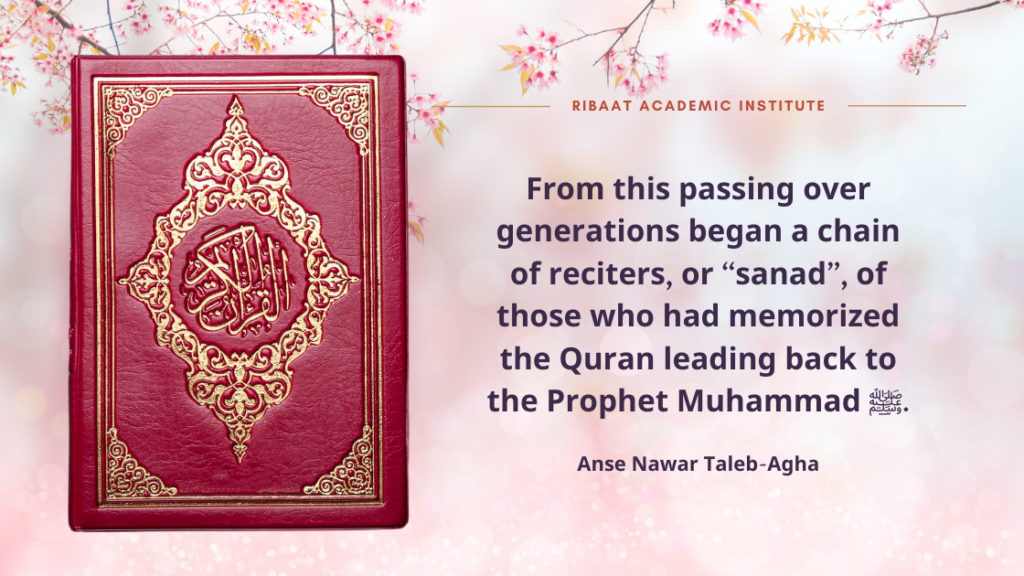Reciting the Quran is one of the most important acts of worship to perform in Ramadan. It was the month when the Quran was first brought down to the heavens of this world and during this month, the Angel Jibreel (‘alayhi-s-salaam) would complete a yearly review of the Quran with the Prophet ﷺ. So it is of the sunnah to increase our Quran reading during this Holy month.
The companions of the Prophet ﷺ also spent their nights during Ramadan in prayer reciting lots of Quran. Even later, many scholars spent as much time as possible reading the Quran. It’s said that Imam al-Shafi’i would complete reading the Quran 60 times during this month. That means he had to read it at least 2 times per day! Imam Malik was said to pause his hadith studies during Ramadan to focus on reading the Quran.
Even now, we hear about people in our communities who complete a reading (or khitma) of the Quran every day, once every 3 days, once a week, and so on. Even in prayer, during the nightly prayer of tarawih, Imams all over the world lead millions of Muslims through one part (or juz’) of the Quran every night of Ramadan until they complete a khitma by the end of the month. It is safe to say that the Quran is being recited at every moment in time somewhere around the world, and during the month of Ramadan, this amount exponentially increases.
When we first learn to read the Quran whether inside or outside of prayer, we are instructed to move our tongue and mouth with the words as it’s not a book meant to be read with the eyes alone – it’s meant to be voiced and heard. In other words, the Quran is an oral ‘text’ that is ‘scribed’ and ‘copied’ with our tongues. As an oral book, memorization, recitation, and pronunciation of the Quran has been central to its study. The Quran was initially memorized by the Prophet Muhammad ﷺ and the first Muslims who then taught it to their children and communities, who then taught it to their children and communities, and so on.
From this passing over generations began a chain of reciters, or sanad, of those who had memorized the Quran leading back to the Prophet Muhammad ﷺ. As Islam continued to spread across the world to people whose tongues weren’t accustomed to pronouncing the Arabic sounds in the Quran, the science of recitation developed to address the phonetics and phonology of the Quran. The phonetics of the Quran refers to the study of sounds in terms of how the tongue is placed for each letter (called makharij) and the characteristics or manner of each sound (sifaat). Phonology refers to certain pronunciation rules that occur based on context, like elongating vowels in certain circumstances or blending sounds in other situations. These rules all together fall under an integral part of Quranic studies and that is the science of tajwid.
Tajwid comes from the Arabic word ‘jawada’, which means to do something well with excellence. In this case tajwid is to recite the Quran with excellence by giving each letter or sound its due right, which is to be recited in the same way that the Quran was revealed to the Prophet Muhammad ﷺ. As Muslims, reciting Quran with tajwid is obligatory, and when we can’t recite or pronounce it right, we must learn the makharij, sifaat and tajwid rules to help us accomplish that.
Those who become masters of Quranic recitation receive a certificate, called an ijaza, that gives the recipient permission to teach Quranic recitation and to become a new link in a chain of reciters that leads back to the Prophet ﷺ. Conditions for obtaining an ijaza are as follows:
1. Recite a khitma of the Quran to one teacher who carries a sanad demonstrating a mastery in the application and pronunciation of the tajwid rules
2. Master the knowledge of the rules of the tajwid, or tajwid theory
3. Recite and be able to explain the 9th Century A.H. tajwid poem Al-Muqaddima Al-jazariyyah
4. Have upright Muslim character
When a student has completed all the conditions mentioned above, the teacher would grant an ijaza to that student accompanied by a printed certificate that includes the written sanad beginning with the name of the recipient connected to a chain of reciters leading back to the Prophet Muhammad ﷺ, then Angel Jibreel (‘alayhi-s-salaam) and ultimately from the One who the words of the Quran originated from, Allah, may His Glory be glorified.
One of the many miracles of the Quran is that it has been and will remain unaltered until the end of times. I believe that part of that miracle happens by the permission of Allah, through the scholars that have learned and passed it down orally one by one, link by link, ijaza by ijaza throughout the generations.
And with an extreme feeling of gratitude for Allah’s favor upon us, at the Ribaat Academic Institute we have many teachers who carry this ijaza and have a program to facilitate the process of obtaining one. It’s not an easy task and may take years to accomplish, but if you’re interested in taking that first step on that journey please reach out. Wherever you are on your Quran journey, whether you’ve just learned how to read, or you’ve been reciting for decades, we have a place for you in our program. We ask Allah ﷻ that He continues to use us as a means for the Quran to be taught to our communities, and may the Quran be used as proof in favor of us, not against us on the day of resurrection. Ameen.
Anse Nawar Taleb-Agha, Ribaat Tajwid Coordinator

